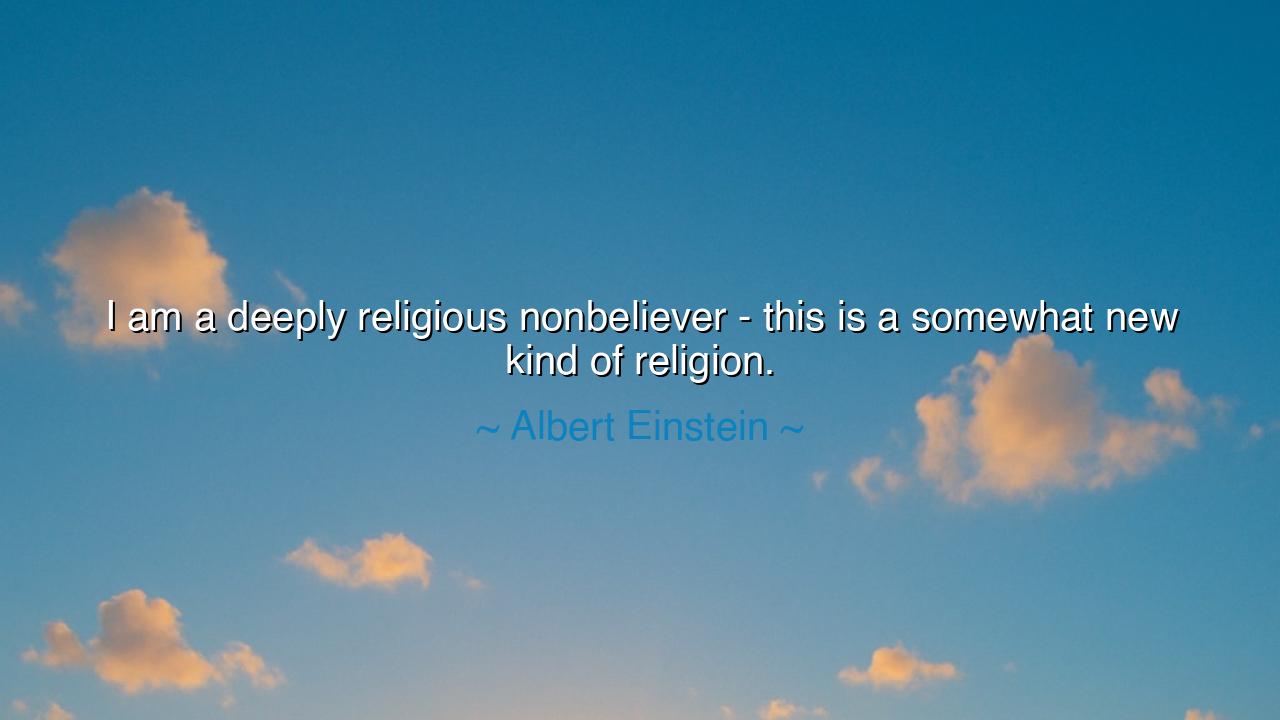
I am a deeply religious nonbeliever - this is a somewhat new kind






“I am a deeply religious nonbeliever – this is a somewhat new kind of religion.” – Albert Einstein
In these enigmatic and luminous words, Albert Einstein, the seeker of cosmic truth, reveals the paradox that lay at the heart of his soul. Though a man of science, he was no stranger to the sacred. He looked not for God in the creeds of men, but in the laws of the universe, in the silent precision of stars and the boundless rhythm of existence. When he called himself a deeply religious nonbeliever, he was describing a faith that needed no altar — a faith born not of worship, but of wonder. His was the religion of awe: the reverence one feels when gazing upon the infinite, knowing that the human mind, though small, can glimpse the vastness of eternity.
Einstein’s religion was unlike that of any church or sect. It was not built on scripture, ritual, or dogma, but upon humility before the mysteries of creation. He did not reject the divine — he rejected the arrogance of thinking that the divine could be captured by human words or confined within human institutions. He once said, “The most beautiful thing we can experience is the mysterious. It is the source of all true art and science.” This is the key to his “new kind of religion”: one that replaces fear with curiosity, judgment with reverence, and blind obedience with understanding. To Einstein, science was not an enemy of faith — it was faith’s purest form, for it sought to know the mind of God through the patient unraveling of nature’s design.
The origin of this quote comes from his lifelong dialogue with both believers and skeptics who tried to claim him for their side. Some said he was an atheist, others that he was secretly devout. But Einstein refused both labels. His belief lay beyond categories. He spoke often of Spinoza’s God — not a deity of miracles or punishment, but a divine presence woven into the harmony of all that exists. To him, God was the sum of the natural order, the quiet intelligence that set the stars in motion and wrote the laws of physics in the fabric of being. He did not pray for favors or fear divine wrath, but he did stand in constant awe before the beauty of the cosmos — and that, he said, was his religion.
Consider the story of Giordano Bruno, the philosopher of the Renaissance who dared to proclaim that the universe was infinite, filled with countless worlds. For this, he was condemned by the church and burned at the stake. Yet Bruno’s fire was not extinguished — it burned in the minds of those who came after him, including Einstein. Bruno, like Einstein, sought God not in doctrine, but in truth itself — the truth revealed through exploration, courage, and thought. Both men remind us that the divine need not be defended by superstition; it reveals itself through discovery. The universe, in its grandeur, is the eternal scripture — and every mind that seeks to read it with honesty becomes a kind of priest of wonder.
Einstein’s words also carry a gentle rebuke to those who mistake religion for certainty. True faith, he believed, begins where certainty ends. “I do not believe in a personal God,” he said, “but I am filled with admiration for the structure of the world.” To be a religious nonbeliever is to bow before the mystery without claiming to understand it. It is to live in reverence without illusion, to see the face of the divine not in images carved by men, but in the laws of nature and the moral light of conscience. Such faith asks for no reward and fears no punishment — it finds holiness in the pursuit of truth itself.
And what is the lesson for us, children of this same vast universe? It is to seek with both reason and reverence, for neither alone can lead us to wisdom. Let us question boldly, as scientists do, but also marvel humbly, as poets and prophets have. Let us not divide the world into the faithful and the unbelieving, for Einstein has shown us that one can disbelieve in gods and yet be devout in spirit — one can deny dogma and yet live in deep communion with the divine order of things. The truest religion, he teaches, is not found in temples, but in the awakening of the heart to the infinite.
The lesson is this: learn to stand in awe. Let your science be a prayer, your curiosity a hymn, your compassion a form of worship. Do not seek God in words, but in the quiet elegance of existence itself — in the movement of galaxies, the spark of thought, the pulse of life. As Einstein’s “new kind of religion” reminds us, we are both small and sacred, temporary yet part of something eternal. To live with that awareness is to honor both truth and mystery, both the mind and the soul.
So remember the wisdom of Albert Einstein: “I am a deeply religious nonbeliever – this is a somewhat new kind of religion.” Do not fear the tension between belief and reason; embrace it. For in that tension lies the beauty of being human — the bridge between knowledge and wonder, between the finite and the infinite. To live with both skepticism and reverence is not a contradiction — it is the highest harmony, the song of a soul awake to the universe.






AAdministratorAdministrator
Welcome, honored guests. Please leave a comment, we will respond soon